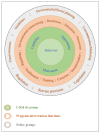Application of an Adapted Behaviour Change Wheel to Assistance Dog Puppy Raising: A Proposed Raiser-Centred Support Program
- PMID: 36670852
- PMCID: PMC9855162
- DOI: 10.3390/ani13020307
Application of an Adapted Behaviour Change Wheel to Assistance Dog Puppy Raising: A Proposed Raiser-Centred Support Program
Abstract
Puppy raising (PR) programs recruit volunteer community members (raisers) to raise assistance dog (AD) candidates from puppyhood until the dogs are ready for advanced training. Once qualified, ADs assist human handlers with a disability to live more independently. Unfortunately, about 50% of all puppies do not meet the behavioural standards required for further training after completing a PR program. This increases costs and lengthens the time taken for a handler to obtain an AD. Research has identified several factors that influence raisers' experiences. It has also shown that raisers' socialisation and training practices affect perceived puppy behaviour. Drawing on the argument that puppy raiser practices are central to improving overall puppy raising program outcomes, this paper interprets recent findings within the framework provided by the behaviour change wheel-an established behaviour change framework-to suggest a coordinated approach to supporting puppy raisers. The recommendations will allow future research to employ more objective measures and more rigorous experimental designs as the field attempts to corroborate existing findings and develop evidence-based models of practice.
Keywords: behaviour change wheel; organisational support; puppy foster carer; puppy raising model; social support.
Conflict of interest statement
The authors declare no conflict of interest. The funders had no role in the writing of the manuscript, or in the decision to publish the results.
Figures
References
-
- Batt L., Batt M., Baguley J., McGreevy P. Relationships between puppy management practices and reported measures of success in guide dog training. J. Vet. Behav. 2010;5:240–246. doi: 10.1016/j.jveb.2010.02.004. - DOI
-
- Asher L., Blythe S., Roberts R., Toothill L., Craigon P.J., Evans K.M., Green M.J., England G.C.W. A standardized behavior test for potential guide dog puppies: Methods and association with subsequent success in guide dog training. J. Vet. Behav. 2013;8:431–438. doi: 10.1016/j.jveb.2013.08.004. - DOI
-
- Batt L.S., Batt M.S., Baguley J.A., McGreevy P.D. The effects of structured sessions for juvenile training and socialization on guide dog success and puppy-raiser participation. J. Vet. Behav. 2008;3:199–206. doi: 10.1016/j.jveb.2008.05.001. - DOI
LinkOut - more resources
Full Text Sources
Research Materials



